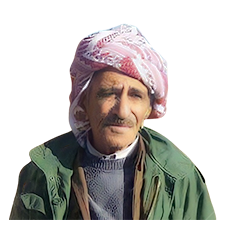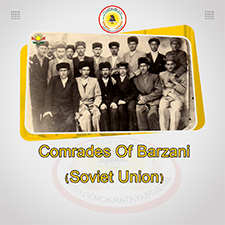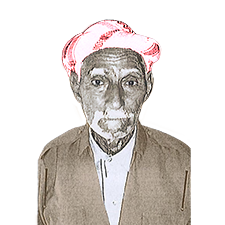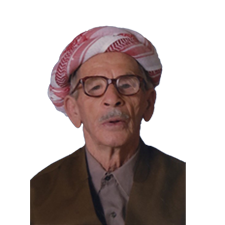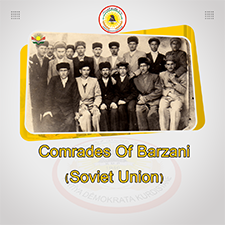Biography:
Badro Lashkri Hussein was born in 1930 in the village of “Bestre” which was a part of Erbil city. Badro married Kurdistan Muhammed Ali, and together they had four sons and one daughter. Their names were Sarkawt, Matin, Halkawt, Rekawt and Aesha. Badro studied in the Soviet Union and got his degree in agriculture. As an immigrant he travels to Iran in 1975. He later returns to Kurdistan in 1995.
In 1943 Badro contacted the soldiers of the second Barzani revolution. He also participated in taking over the “Goratu” police department on the 6th of September 1943. Additionally, he participated in taking over the “Maydan moriki” police department on the 5th of September 1945. Because of his involvement in the revolution, on the 19th of August in 1945, the court of “urfi Sarbazi” took possession of all his belongings.
Following the fall of the second Barzani revolution, Badro and his brothers, Ahmadi Lashkri and Sherif Lashkri, joined the army of Barzani as Peshmergas in the Republic of Kurdistan in Mahabad. They were part of the army of Sailh Mustafa in “Saqz”.
Badro has participated in many battles. For example, the battle of “Qaraway” on the 29th of April 1946, the battle of “Mlqarani” on the 3rd of May 1946. After the fall of the Republic of Kurdistan, Badro fought in the battle of “Nalos” on the 3rd of March 1947; also, he participated in the battles “Naghada” and “Shno” on the 19th of March 1947.
Following the fall of the Kurdistan Democratic Party (KDP) in Mahabad and the return of Barzani from eastern Kurdistan to southern Kurdistan, Badro participated in the battles of “Naghada” and “Shno” in eastern Kurdistan. Also, he was one of those peshmergas on 19/4/1947 who went through the road of “Khwakurk u Dashti Baraz grawa” on the land of northern Kurdistan to return to “Sherwan” and “Mzuri”. After their return, General Mustafa Barzani on 15/5/1947 in the village of “Argush” conducted a meeting with his comrades and gave them the freedom of whether to stay or go to the Soviet Union. In the meeting, everyone decides to leave and go to the Soviet Union. On the 23rd of May in 1947, Badro travels with General Mustafa to the Soviet Union and fights in the battles of “Gali Qtur” and the “Mangoor”. After a lot of hardships, on the 18th of June in 1947, he was able to travel to the Soviet Union after passing through the Aras River which was between the borders of Iran and the Soviet Union.
After their arrival at the Soviet Union on the 19th of June in 1947 in the city of “Akhchawan” in the Republic of Azerbaijan, all of the comrades were placed in a community that was surrounded by barbed wire. They were being monitored by the soldiers and were treated like hostages of war when it came to food and clothes. Afterwards, the Soviet government decided that the comrades should be divided into the places of “Aghdam”, “Lachin”, “Ayulax” and “Kalbajar” in the Republic of Azerbaijan. On the 10th of December in 1947, they were transported to a military camp on the lake of “Khazar” in the capital of the Republic of Mahabad “Bakor”. On the 23rd of the same month, they were given military clothes and were trained by the officers of the republic 8 hours a day. On top of that, some of the comrades that were literate in Kurdish would teach the language for 4 hours a day.
After the ill-treatment of “Jaafar Baqrov” with the comrades, on the 29th of August in 1949, Barzani decides to transport his military camp from the republic of Mahabad to a “Chrchuk” community near the city of “Ashkand” which was the capital of Uzbekistan; there they continued their military practices.
In March of 1949, the comrades were divided into the villages of the Soviet Union and farms (where civilians would rent them from the governments and pay them back later). The comrades were working in these places.
Following multiple letters to Stalin by General Barzani, a letter finally reaches Stalin where it talks about the hardships the comrades are going through. Stalin immediately creates a party to investigate the comrades of Barzani; the party comes to the decision that everyone should gather in the city of “Vrivsky”. Everyone travels to the city in November of 1951.
Badro along with his comrades travels back to Kurdistan with the ship “Grozya” through the harbor of “Basra” on the 16th of April in 1959.
He participates in the revolution of “Aylul” in 1963. Additionally, he was part of the battles of “chyay Pirs” and “Sare Akre”. Afterwards, along with Mustafa Barzani, he goes to Soran. Then he joins his brother’s army until 1975. After the fall of the “Aylul” revolution in 1975, Badro migrates to Iran. At first, he resides in the community of “Zewa”. Then, he is transferred to “Asfahan” and later “Tawrez”. In 1980 he participates in the “Gulan” revolution. Moreover, he becomes a Peshmerga in the office of President Masoud Barzani.
Badro returns to southern Kurdistan in 1995. Moreover, on the 11th of October 2010, at the 13th conference of the Kurdistan Democratic Party (KDP), he was given the Medal of Barzani by President Masoud Barzani for his bravery and participation in the revolutions and battles for the freedom of Kurdistan.
Sources:
- حامید گهوههری، میدالیای بارزانی بهرزترین خهڵاتی ڕێزلێنان، بهرگی یهكهم، (ههولێر - چاپخانهی حاجی هاشم - ٢٠١٥).
- حهمید گهردی، پوختهی مێژوونامه، چاپی یهكهم، (ههولێر - دهزگای چاپ و بڵاوكردنهوهی ئاراس - چاپخانهی وهزارهتی پهروهرده - ٢٠٠٤).
- حیدر فاروق السامرائي، ضیاء جعفر و دوره السیاسي و الاقتصادي في العراق، (لندن – دارالحكمة - ٢٠١٦).
- بهدرۆ لهشكری حسێن، فۆرمی هەڤالانی بارزانی (بارەگای بارزانی – لێژنەی ناوچەی بارزان).
- نص قرار لجنة العفو العام برد الاعتبار الى شهداء ثورة بارزان، مجلة رزگاری، العدد ٣،٢، المطبعة الرابطة، بغداد، ١ نيسان ١٩٥٩.




